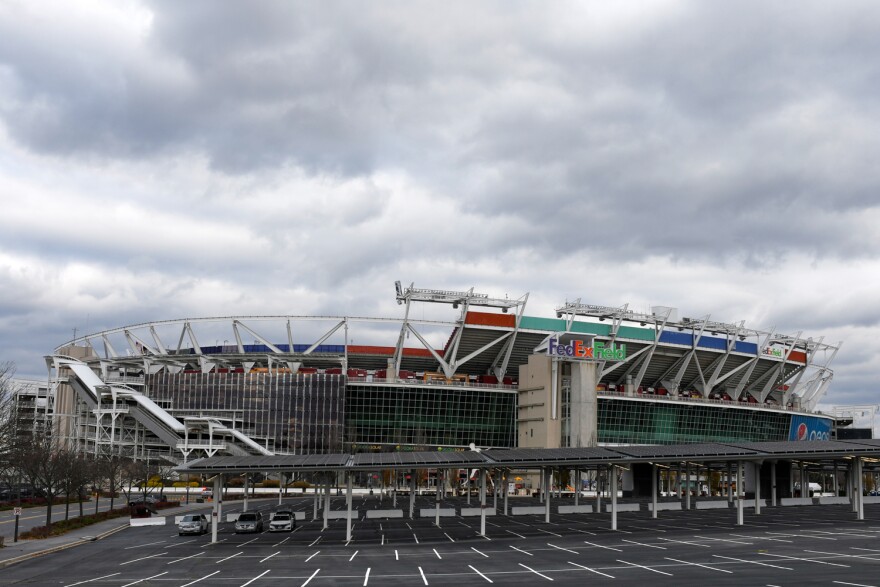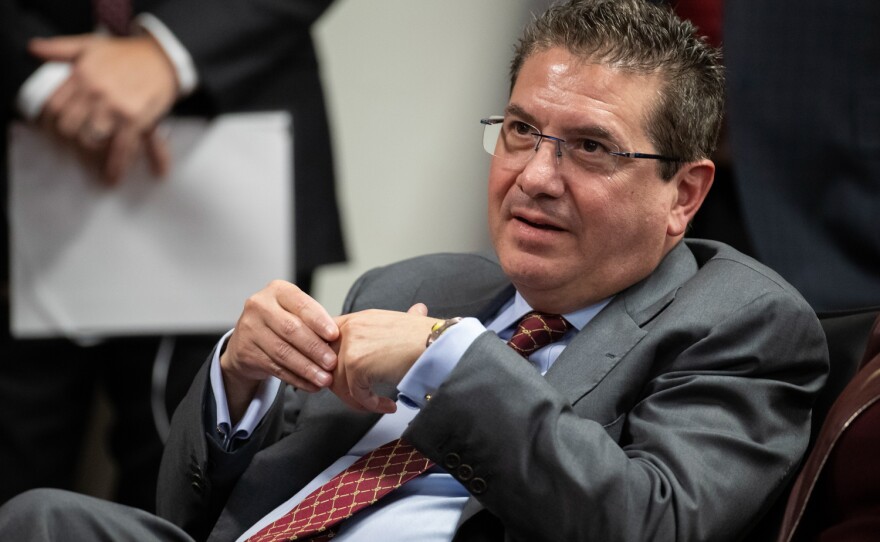In October, Washington Commanders owner Dan Snyder spent $48 million in an all-cash deal for a house in Alexandria. The palatial estate on the Potomac was once a part of George Washington’s Mount Vernon. Now, Virginia lawmakers are hoping to also lure the billionaire’s team across the river from Maryland by leveraging roughly $1 billion in tax subsidies to pay for a new stadium. The price tag is bigger (though differently structured) than the $750 million that drew Amazon’s second headquarters to the commonwealth.
Backers say the massive new project will easily pay for itself by drawing thousands of visitors and residents to a new “mini-city” in Northern Virginia. They say it would drive economic growth and Virginia’s leadership in the growing D.C. metro area. The plan is a rare major point of agreement between Republican Gov. Glenn Youngkin and Senate Majority Leader Dick Saslaw (D-Fairfax) as well as bipartisan majorities in the General Assembly.
But the projections and plans that underpin lawmakers’ rhetoric haven’t been made public. The lack of transparency has given some experts pause. Some residents, meanwhile, are worried about increased traffic and local infrastructure costs. Others are wary of giving Snyder or the Commanders any incentives amid a Congressional investigation and allegations of sexual misconduct toward team employees.
The critics include Snyder’s new Congressional representative in Alexandria, Rep. Don Beyer (D-VA 8th). Beyer, who calls himself a fan of the team, is one of three sponsors of federal legislation that would remove the federal tax-exempt status of municipal bonds used for any stadium.
“The Los Angeles Rams just got a new stadium that they paid for themselves,” Beyer says. “I don't know why we have to continue turning to the taxpayers to pay for the wealthiest people's play toys.”
Those arguments haven’t swayed other regional leaders. Lawmakers in Maryland are reportedly putting together their own package, and Washington, D.C. Mayor Muriel Bowser is also courting the team – at least on Twitter. In a panel hosted by the Economic Club of Washington, D.C. last month, Commanders president Jason Wright sidestepped questions on the details of the team’s plans, pitching the team “as stewards of the economic development and social impact objectives of the area.”
“We are thinking about how we get in line as an act of service to leaders in the community,” Wright said.
A spokesperson for the team did not respond to repeated requests for comment.
A hub for development
Growing up, Sen. Scott Surrovell’s Sundays were all about football and the NFL team now known as the Washington Commanders.
“My entire Sunday revolved around watching the team play,” he says.
Surrovell became a season ticket holder but gave up after the team languished for most of the last 20 years. Now the Democrat is part of a push to bring them to his district when their current lease at FedEx Field in Maryland expires in 2027. He’s met with team officials and seen plans for a massive new development. It includes training facilities, office space, new housing, retail and a 14,000-seat amphitheater according to WUSA, which obtained copies of draft plans. Two of the three proposed sites are in Surrovell’s district in Prince William County, off I-95.
“I think it’ll be a hub for development.,” Surrovell says. He also has an ulterior motive as a longtime fan: “At the end of the day, what I really hope is this just makes the team better.”
Two different bills making their way through Virginia’s General Assembly have won some bipartisan support. Both would allow the estimated $1 billion stadium and associated facilities, like training fields and team offices, to be subsidized using tax-exempt bonds issued by the new Virginia Football Stadium Authority. A portion of state taxes collected at the site would pay down the debt; in a floor debate, Saslaw cited projections of about $60 million a year in tax receipts kept by the state, a similar total retained by the local government and $34 million set aside to pay for the stadium. Future improvements could also be paid for using bonds issued by the authority, and local governments could decide to chip in their own tax subsidies to help pay for the project.
The state wouldn’t be required to dip into general funds if the tax projections don’t pan out, according to Saslaw. The rest of the roughly $2 billion development would be privately financed. It’s enough to win over traditional subsidy skeptics like state Sen. Steve Newman (R-Bedford).
“Not only is not one dime going to be written out of our coffers, but $1.8 billion is going to be coming in,” Newman said on the Senate floor last month.
Creating wealth
The projections cited by lawmakers have never been made public. VPM was rebuffed in attempts to obtain copies from the Senate Finance Committee or Saslaw’s office, where a staffer hung up on a reporter asking for clarification. The Commanders didn’t respond to requests to see the estimates.
That’s a big red flag for Mark Rosentraub, a professor of sports management at the University of Michigan, who called the lack of public details an “extraordinary risk.”
“To be really blunt with you, if you don't see it, then this is an unwise investment,” Rosentraub says.
The economics are especially tricky for football stadiums given how few events they host. That means the surrounding development would need to draw in new visitors and new revenue for the project to make financial sense. Rosentraub says the Dallas Cowboys’ 91-acre home in Frisco, Texas, is one success story, and Surrovell points to that facility as a model for what could happen in Virginia.
In order for the math to work, experts say the new complex needs to attract out-of-state visitors who aren’t already spending money in the commonwealth.
“Sports doesn't create wealth,” Rosentraub says. “All that sports does is relocate economic activity.”
Andrew Zimblast, a sports economist at Smith College, said the net new generation of state tax revenue is likely “very small or zero.”
“The notion that this is a free good – that the state could have this and there would be no costs and no issues in repaying the construction costs – it just doesn't make sense to me,” Zimblast says.
Other academic studies have consistently shown that stadiums aren’t the best use of subsidies. A 2001 reviewby the Federal Reserve Bank of St. Louis found that it can be irresistible for cities to compete for teams using subsidies. “The weight of economic evidence, however, shows that taxpayers spend a lot of money and ultimately don't get much back,” the report says. A 2020 study published in the National Tax Journal estimated that tax-exempt bonds issued to finance stadiums cost federal taxpayers $4.3 billion since 2000 with little to show for it in return.
Controversies surround Snyder
Former Commanders fan Peter Fedders sees another reason not to support the deal. He lives near a third proposed site in Loudoun County, near Dulles International Airport.
“It's not just the deal with just some regular NFL owner,” says Fedders, a 40-year-old government contractor. “We're talking [about] Dan Snyder.”
Fans have accused Snyder of mismanaging the team and driving the prolonged slump. He’s also been accused of presiding over – and participating in – a culture of workplace harassment. The accusations, which Snyder denies, resulted in a $10 million fine from the NFL and an ongoing Congressional inquiry. Fedders says it should be enough to give lawmakers pause.
“The last thing we need is some 30-year, billion-dollar deal that likely will go south, because most things with Dan Snyder go south,” Fedders says.

Fedders has other concerns. His home in Leesburg already battles bad traffic. And he says the local economy – which is home to tech giants like Google – is already strong. “It's not like it's some depressed area that is in need of revitalization,” he says.
Leesburg Mayor Kelley Burk agrees, saying she’s heard “a very strong outpouring” from critics of the deal. “We have most certainly some great teams here and some great sports facilities,” Burk says. “But nobody helped them build those facilities.”
Ann Wheeler, the chair of the Prince William County Board of Supervisors, sounded more upbeat, saying in an email that Prince William offered a large fan base, proximity to I-95 and a well-educated workforce. Still, she declined to be interviewed on the project.
Surovell says the county relies heavily on property taxes to pay for schools and other services. While the sites in the county don’t have Metro stops, Surrovell says the development could expedite plans to build them, a move that could increase density and attract new residents. The Senate Democratic caucus vice chair says he’s concerned about the allegations against Snyder but says it’s not Virginia lawmakers’ job to investigate: “I just don't think that that's something for us to get involved in,” he says.
Many Democrats in the House of Delegates felt otherwise, voting for a failed amendment from Del. Marcus Simon (D-Fairfax) that would have required the NFL to hand over the results of its internal investigation into the allegations to Congressional investigators – something the league has so far resisted doing.
Snyder is not new to politics. He contributed $1 million to Former President Donald Trump’s 2017 inauguration and has also cut smaller checks to Virginia Democrats like former Gov. Terry McAuliffe and Sen. Mark Warner. Reporters learned about Snyder’s new Virginia home – which real estate experts called one of the most expensive home sales on record in Virginia and the D.C. area – after he contributed $25,000 to Youngkin’s inaugural committee.
At an event earlier this week, the governor said legislation in the General Assembly set up the “the foundational principles” to move forward with a negotiation with the Washington football team.
“I think this is a moment for us to recognize that having a professional sports team in Virginia would be a very important economic development opportunity," Youngkin said.




